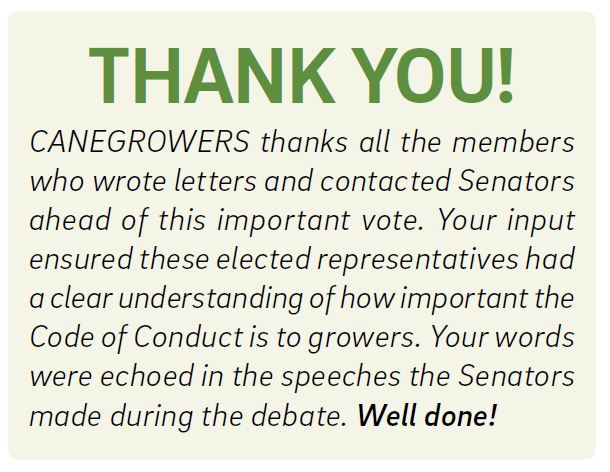A vote of 37-18 has emphatically ended the bid by a New South Wales Senator to disallow the Sugar Industry Code of Conduct. The result is a big relief to growers.
Here's how the saga unfolded:
In August, New South Wales Senator David Leyonhjelm moved a motion in the Senate to disallow the Code of Conduct which had been put in place by the Coalition Federal Government in April, as contract negotiations between growers and Wilmar Sugar ran perilously close to the start of the 2017 harvest.
The reaction from growers was swift. CANEGROWERS Chairman Paul Schembri condemned the move saying the Senator had never contacted grower representatives before making his move against the Code.
“This Code prevents mills from abusing that monopoly position in negotiations. It keeps the parties on track and negotiating fairly and without intimidation and provides a mechanism to break deadlocks," Mr Schembri said. “It lays the foundation for stability and confidence in the industry. Everyone knows the rules and there is a process to follow.”
CANEGROWERS staff, elected representatives and members sprang to action, writing to and calling Senators from all parties to make sure they understood the importance of the Code to growers. CANEGROWERS sent delegations to Canberra and met with everyone who would listen.
Behind the scenes, Queensland LNP Senator Barry O'Sullivan and others worked the politics to secure the votes needed to defeat the motion.
.JPG)
“The big boys, the Wilmars, one of the biggest processors in the world, can look after themselves.”
Senator Leyonhjelm claimed the Code's requirements would stifle investment in the sugar industry and hurt Australia’s international competitiveness. He said the Code should be disallowed because it was unbalanced and hastily prepared.
“This code tilts the scales heavily in favour of the blinkered demands of those who complain the most, to the long-term detriment of the entire sugar industry,” he said.
NSW Nationals Senator John Williams was quick to point out that Senator Leyonhjelm had the situation very wrong.
“Leaving it to the market is fine when you have a fair, competitive market," he said. "But the fact is that, when cane
growers grow their cane, they must take it as quickly as possible to the nearest processing plant—the nearest mill."
Coalition Senators, along with those from Pauline Hanson's One Nation, the Greens and a number of cross-benchers ensured the motion was defeated.
Greens Senator Janet Rice flagged concerns about the Code to be addressed during a review required to take place next year but said, “Ultimately, having this code with its laws is much better than having no code at all.”
"The Greens will not be supporting Senator Leyonhjelm's disallowance of this code tonight, because we are standing up for farmers, against the predatory behaviours of those multinational corporations who, if this code was disallowed and no longer existed, would be able to keep on screwing down the screws and hanging cane growers out to dry.”
This position was in contrast to the ALP which sided with Senator Leyonhjelm.
Labor's Senator Carol Brown said, “Until adequate consultation is had and the views of various stakeholders are heard, we believe that the current code is not good enough and should be ripped up."
The only surprise in the 37-18 vote against the motion was Senator Derryn Hinch voting in favour of disallowance. He did not address the Senate.
Read the CANEGROWERS media release issued immediately after the vote.

.jpg)
